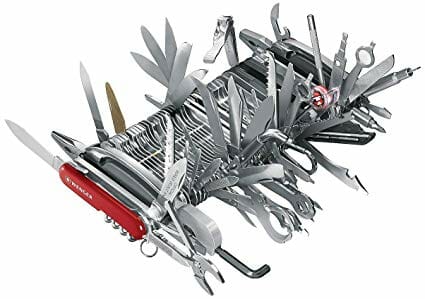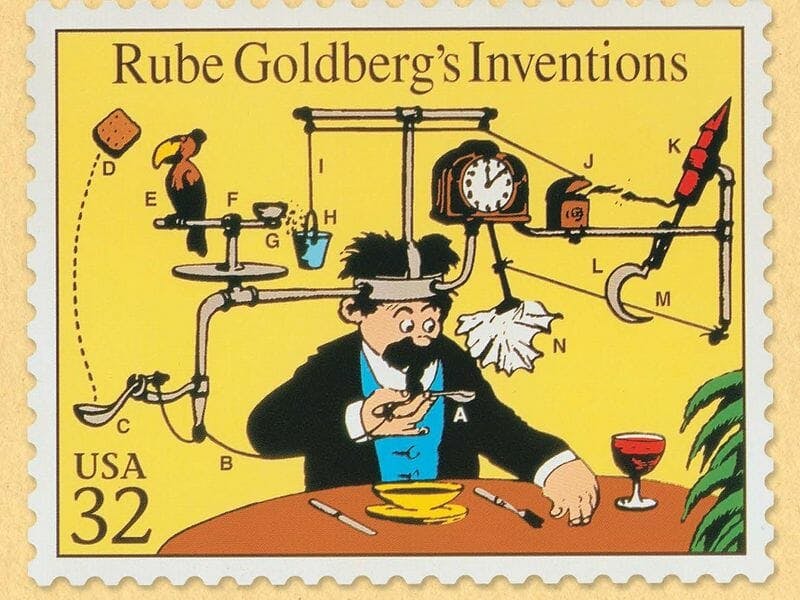“People think focus means saying yes to the thing you’ve got to focus on. But that’s not what it means at all. It means saying no to the hundred other good ideas that there are. You have to pick carefully. I’m actually as proud of the things we haven’t done as the things I have done. Innovation is saying no to 1,000 things.” – Steve Jobs, former CEO of Apple.
 The Swiss Army knife is one of those models of efficiency we’ve all heard of. It’s a tool many of us have used. But even efficiency can be broken. Consider the Wenger 16999 Giant. If you were stranded on a desert island and allowed one tool, you’d choose this Swiss Army knife. It has 87 implements with 141 functions, but it won’t fit into any pocket less than a foot deep. It weighs seven pounds and retails for $1,400.
The Swiss Army knife is one of those models of efficiency we’ve all heard of. It’s a tool many of us have used. But even efficiency can be broken. Consider the Wenger 16999 Giant. If you were stranded on a desert island and allowed one tool, you’d choose this Swiss Army knife. It has 87 implements with 141 functions, but it won’t fit into any pocket less than a foot deep. It weighs seven pounds and retails for $1,400.
The 16999 is what happens when a project gets scope creep. In their exuberance to create a single tool that could do everything, Wenger produced something that can barely do anything. Seriously, how can you use the nail file or the corkscrew on this behemoth?
Too often, we let our project scope, our job, and even our mission slowly devolve into unmanageable messes simply by allowing extra duties or features to slip in, even after we’ve supposedly locked everything down. If you’re suffering from the creeps, implement these practices to delete them from your work.
Tightly document and stick to project requirements — It’s easy for projects to get out of whack; all it takes is one extra feature added after the fact, and suddenly you’re behind or over-budget. Perhaps your client asks, “While you’re in there, can you add this little change?” This may seem minor, but if it keeps happening, the sleek Jaguar you agreed to build may become a Sherman tank. Stick to your guns; say no. Write your contracts so extra features cost extra in terms of both money and time. Base the project on your client’s vision at the beginning of the project and have them sign off on it. Accept nothing new without raising the price and resetting the schedule. Emphasize this from the beginning and enforce the rules.
Establish a precise understanding of your role — Does your job description from two years ago look anything like today’s reality? If not, your job or role within the organization has suffered creep. Ideally, this is your manager’s responsibility, but if things get a bit too hazy, sit down and refocus your vision. You may have allowed your emphasis to drift away from the core components of your job. With a little introspection, you may see you’ve spent too much time tightening bolts on the periphery when you were better served working on the core of your job process.
Be honest with your superiors — Sometimes a role creeps because your superiors instruct you to expand it beyond its original borders. While I would never recommend telling them, “That’s not my job,” if you’re asked to do something farther afield than you’ve trained for, inform your manager of the limitations you’re facing. They may have a good reason for asking you to do it. But if your role/job has creeped to the point where you can’t confidently handle a task due to lack of training, request additional help. Either you’ll get the training, or your role will stop creeping into unfamiliar territory.
Clarify your core values and vision — These represent the heart of your business. Do you even know what they are? If so, do you still follow them, or have they fallen by the wayside? To help your organization stay true to its core values, mission, and vision, clarify to yourself exactly what they are, and hew closely to them as you move forward. Think deeply when someone suggests a change to your core business. If it doesn’t match your core values, say no to the change if you have the power to do so, or at least argue strongly against it.
It’s easy to let things go and drift through your days, working hard without keeping an eye on where you’re going. But that’s dangerous. If you don’t stop to look at what’s coming, you may never see the pitfalls and obstacles ahead until too late… and you may not notice you’ve crept right off the road set by your scope, job, or mission, and plowed through the weeds for miles. Keep your eyes wide open!
This was originally published on Laura Stack’s The Productivity Pro blog.
